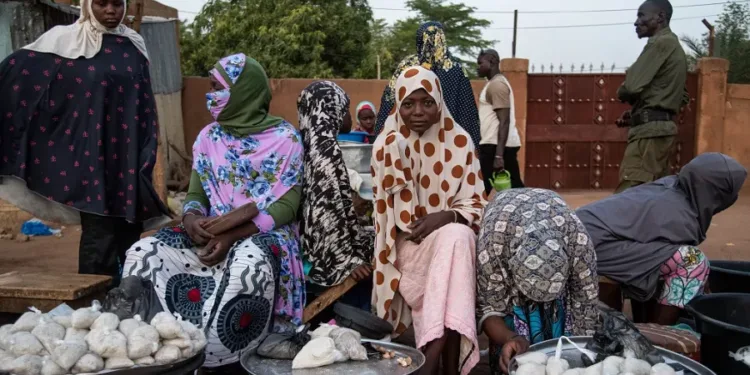The citizens of Niger Republic are struggling with the prices of food making it difficult for Muslims to afford basic items during the Ramadan season.
The inflation started due to the transition of power as the country’s border got closed off from neighboring countries that export food items to Niger for over eight months.
While the recent lifting of the embargo just weeks before the start of Ramadan provided a glimmer of hope, the ground reality continues to be dire for many citizens of Niger Republic.
The cost of food items like rice, sugar, oil, and milk, has skyrocketed, rendering them prohibitively expensive for a significant portion of the population.
Despite the easing of the embargo, the challenges related to affordability and accessibility of essential goods persist, impacting the ability of individuals and families to observe Ramadan with the traditional festivities and provisions.
Also Read: Ramadan: How Algeria Is Meeting High Beef Demands
The capital city, Niamey is not left out of the inflation. A resident, Kadidja Bagnou shared her experience at her local market reflecting on the challenges facing ordinary citizens. she couldn’t afford food items like sugar as it has become extremely expensive. In her words,
“A sack of sugar costs 32, 000 CFA and 25 kilos makes 20,000 CFA. We cannot pay it, we ask the government to make it cheaper.”
The disparity between current prices and what citizens are accustomed to pay puts a strain on household budgets.
Speaking to the press, another citizen, Soumana Adamou voiced his frustration about the comparison between the old prices and the current one. He said, The prices of products have gone up, especially products I usually pay for, most of which have had their prices increased. For example, this morning, I asked for the price of Basmati rice in the supermarket and they told me it was 80,000CFA whereas I usually pay 30,000CFA.”
Delays and inefficiencies in transporting goods only exacerbate the existing food shortages and contribute to price inflation. Importing food materials has been a major challenge, and transporting food through the borders of different nations has proved difficult.
Niger Republic’s economic challenges may also stem from a combination of factors, with the military’s struggle to ensure the adequate supply of essential goods being a significant contributor.
The disruption caused by the embargo imposed on certain goods has exacerbated existing economic vulnerabilities, highlighting the military’s limitations in effectively managing the economy.
As a result, many citizens of Niger Republic are struggling with financial hardship, as the availability and affordability of essential commodities continue to pose significant challenges.
The military’s efforts to address these issues and stabilize the economy are critical in alleviating the economic burden faced by the population and fostering sustainable growth and development.
As Ramadan begins, the people of Niger Republic are struggling to afford foodstuffs coupled with the difficulty of fasting.
Over the past two years, Niger Republic has been experiencing food inflation and it’s no different in 2024.
FinTech Telex recalls that after the coup in 2023, the closure of borders by the Economic Community of West African States (ECOWAS) poses a particular threat to the landlocked and impoverished Niger Republic. This closure increases the rate of food shortages within the country.
Before the coup, around 3.3 million of Niger Republic’s 26 million people were facing acute food shortages as a hunger crisis grips parts of the region.
After the coup, several citizens embarked on panic shopping which contributed to the increase in the prices of food items across the country.
Amongst several complaints, customer Ibou Kane said a sack of rice had gone up by more than a third to around 15,000 CFA francs ($25) since the coup prompted the ECOWAS economic and political bloc to close borders and sever commercial ties.
With the new directives to open the border, the citizens of Niger Republic are expectant for a more affordable price.










